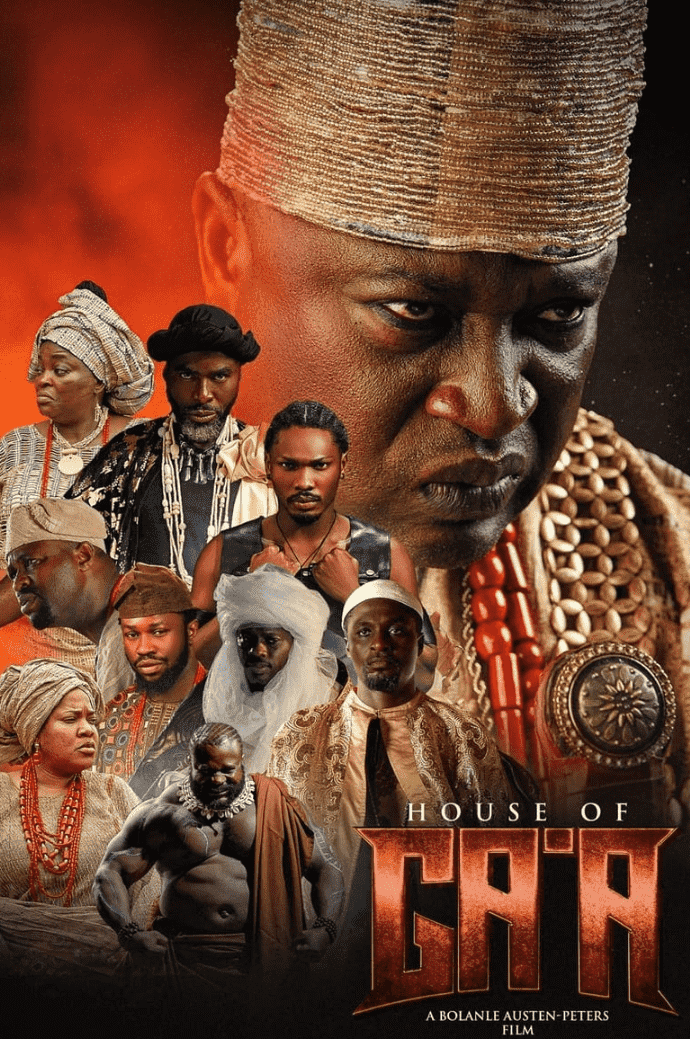In an attempt to breathe life into a chapter of Yoruba history, House of Ga’a reimagines the rise and fall of one of the most notorious Prime Ministers of the Oyo Empire. Written by Tunde Babalola and directed by Bolanle Austen-Peters, this historical drama promises a cinematic journey through the tumultuous era of Bashorun Ga’a—a figure whose name became synonymous with power, tyranny, and eventually, downfall.
The Rise and Fall of a Tyrant
House of Ga’a opens with a gripping depiction of the war between the Oyo Empire and the Nupe Kingdom. The Oyo Empire, under the ruthless leadership of Ga’a, emerges victorious, cementing his status as a formidable warrior. His valor earns him the title of Bashorun, the highest-ranking military officer, appointed by the reigning Aláàfin Olabisi.But Ga’a’s ambitions don’t stop at military prowess. His thirst for power drives him to orchestrate a coup that forces Aláàfin Olabisi to commit suicide—a traditional mandate for kings deemed unworthy or disloyal. What follows is a reign of terror as Bashorun Ga’a installs puppet kings who answer only to him, ruling the Oyo Empire with an iron fist. His demands grow increasingly sacrilegious, pushing the boundaries of the sacred and the profane.However, his unchecked power breeds resentment. One Aláàfin, in particular, proves to be more than a mere figurehead, setting off a chain of events that will eventually lead to Ga’a’s own demise.

Decoding the Title: What Does ‘Baṣọ̀run’ Mean?
The term ‘Baṣọ̀run’ is derived from Yoruba, combining ‘Iba’ (Lord) and ‘Ọ̀run’ (Heaven). It’s more than just a title; it’s a powerful position in the Oyo Empire, akin to that of a Prime Minister. The Baṣọ̀run was the custodian of the Orun festival, a crucial spiritual event, and wielded significant influence, often determining the fate of kings.
Historical Accuracy: A Matter of Debate
While House of Ga’a presents itself as a historical recount, scholars and critics argue that it takes creative liberties with the facts. For instance, the film suggests that after Ga’a’s fall, his son Oyemekun sought refuge with the Fulanis in Ilorin—a detail that doesn’t align with historical records. At the time of Ga’a’s downfall, Ilorin was still under Yoruba control, not yet overtaken by the Fulanis.Furthermore, the language used by the characters has been criticized for not accurately reflecting the Yoruba dialect of the era, and some key historical events are depicted differently in the film than they are in historical accounts. For instance, it’s contested whether Aláàfin Aboluwaji and Aláàfin Olabisi were truly forced to commit suicide as the movie portrays; historical evidence suggests they voluntarily took poison to avoid disgrace.
A Cinematic Experience Worth Watching
Despite these historical inconsistencies, House of Ga’a offers a captivating cinematic experience. The film’s themes of violence, power, loyalty, love, and betrayal are compellingly portrayed by a stellar cast. Femi Branch, who plays Bashorun Ga’a, delivers a standout performance, bringing to life the complexity of his character with a chilling authenticity that’s hard to forget.The film excels in its technical aspects as well. The sound effects are well-synced, enhancing the tension and drama of each scene. The special effects (SFX) represent a significant upgrade from typical Nollywood productions, and the cinematography beautifully captures the grandeur and grit of 18th-century Yoruba land.The costumes, while not entirely accurate for a historical setting, are visually striking and contribute to the film’s overall aesthetic. And while the Yoruba language may not be historically precise, the dialogue is rich with proverbs and symbolism that resonate with the cultural essence of the Oyo Empire.

Final Verdict: A Must-Watch Nollywood Epic
House of Ga’a may not be a perfect historical recount, but it’s a thoroughly entertaining film that offers a glimpse into a fascinating period of Yoruba history. If you’re in the mood for an epic Nollywood drama that keeps you on the edge of your seat, this film is well worth your time. On a scale of one to ten, we’d give House of Ga’a a solid six.
It’s a film that draws you into its world, even if that world strays a bit from the historical record.
Mediapeephole approves!





